Finding The Perfect Plank: Your Guide To Decking Decisions
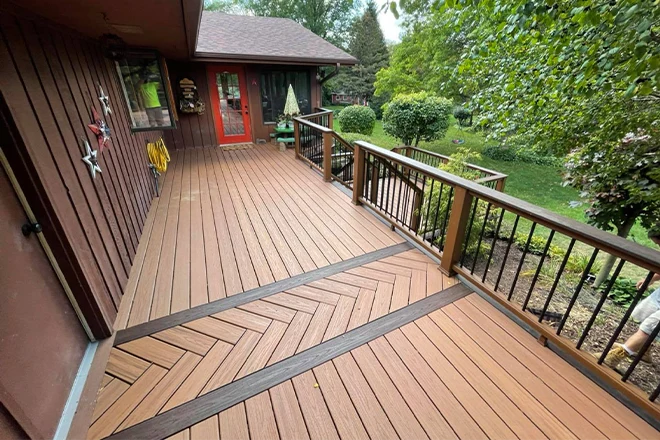
Are you dreaming of summer barbecues and cool evening lounges, but your backyard feels a bit… bare? Wondering how to transform your outdoor space into a personal oasis with the perfect deck but overwhelmed by the ocean of material options?
This post will guide you through the forest of deck material—from wood to composite, PVC to aluminum—breaking down the pros and cons of each to help you make an informed decision.
By the end of this read, you’ll not only be equipped to choose the best material for your Belvidere, IL, deck installation but you’ll also understand how this choice can enhance your home’s value and your quality of life.
Deck Material Pros & Cons
Choosing the right deck material is crucial for homeowners in Belvidere, IL, who are looking to enhance their outdoor living spaces. With various options available, selecting the best decking material that suits your aesthetic preferences, maintenance willingness, and budget can be a daunting task. This section explores the different materials for deck boards, including wood decking, composite decking, PVC decking, plastic decking, and aluminum decking, to help you make an informed decision for your decking project.
Wood Decking
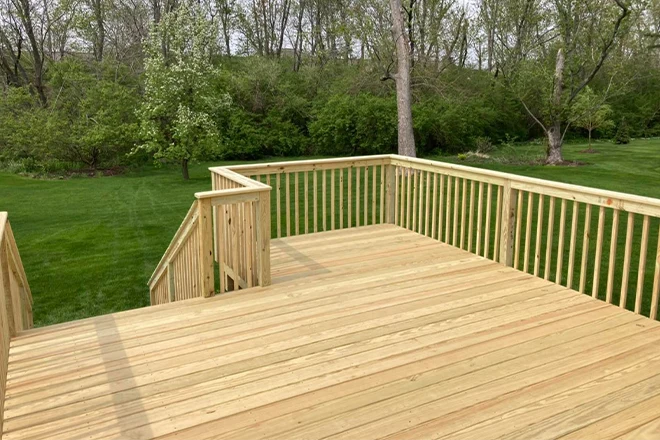
Pressure-Treated Wood
Commonly used in Belvidere and the surrounding neighborhoods like Poplar Grove, pressure-treated wood decking is a staple in deck building.
This deck material undergoes a chemical treatment process to resist rot, decay, and termites, making it a durable option for a wood deck.
It’s often made from Southern yellow pine and is the most cost-effective choice for decking material.
Pros:
- Cost-effective and widely available.
- Treated to resist rot, decay, and termites.
Cons:
- Requires annual maintenance to prevent splintering and warping.
- Chemicals used in the pressure-treating process may raise environmental and health concerns.
Cedar And Redwood
Cedar and redwood offer unique aesthetic appeals with their rich colors and natural wood grain patterns.
These woods contain natural oils and tannins that make them resistant to decay, insects, and weathering, offering a more natural alternative to pressure-treated wood.
Pros:
- Natural beauty with a distinct wood grain appearance.
- Natural resistance to decay and pests without the need for chemical treatment.
Cons:
- Higher cost compared to pressure-treated wood.
- It requires regular maintenance, like staining and sealing, to maintain its color and resistance.
Tropical Hardwoods
Tropical or exotic hardwoods, such as Ipe, Mahogany, and Teak, are prized for their extreme durability and natural resistance to rot, insects, and weather.
These exotic woods offer a luxurious look for any deck space but come with a higher price tag.
Pros:
- Exceptional durability and longevity.
- Rich, exotic appearance with a dense wood structure.
Cons:
- Significantly more expensive than other wood decking options.
- Difficult to install due to their density, requiring special tools.
Composite Decking
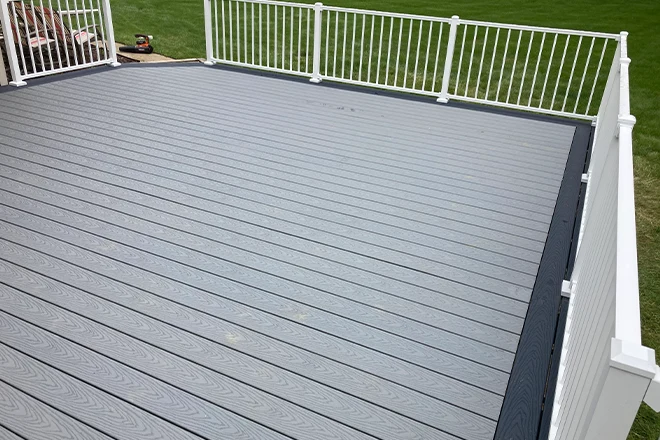
Composite decking materials, combining recycled plastic and wood fibers, offer a sustainable and low-maintenance alternative to traditional wood decking.
Available in a variety of colors and wood grain textures, composite deck boards provide the beauty of wood without the high maintenance.
Pros:
- Low maintenance deck material, requiring only occasional cleaning without the need for staining or sealing.
- Made from recycled materials, making it an environmentally friendly option.
Cons:
- Higher upfront cost compared to wood decking.
- Some homeowners may prefer the natural look and feel of real wood.
PVC Decking
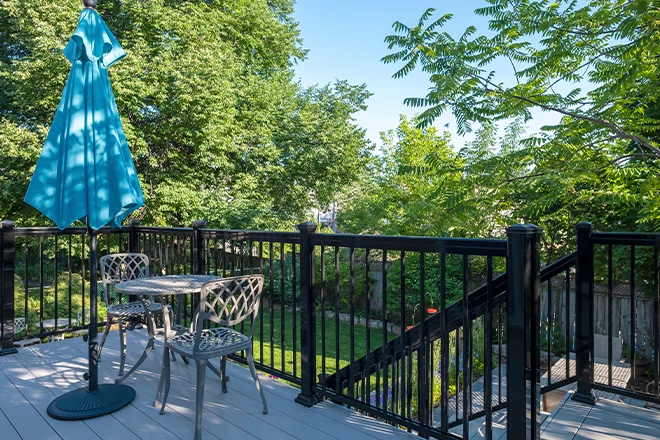
Characterized by its durability and design flexibility, PVC decking is a synthetic material that offers a range of style options without involving any wood fibers. This type of decking is resistant to moisture, stains, and fading.
Pros:
- Virtually maintenance-free deck material with excellent resistance to the elements.
- Available in a variety of colors and styles, including those that mimic natural wood.
Cons:
- Higher initial investment than wood decking.
- Some may find the feel and sound of PVC decking less natural than wood.
Plastic Decking
Plastic decking, made entirely from recycled plastic, provides a highly durable and eco-friendly option for homeowners. It stands up well to the elements and requires minimal maintenance over its lifespan.
Pros:
- Requires little to no maintenance over its lifespan.
- Will not rot, warp, or splinter over time.
Cons:
- This deck material can feel less natural underfoot compared to wood or composite materials.
- Limited aesthetic options compared to wood and composite decking.
Aluminum Decking
Aluminum decking is the most durable and long-lasting material available, offering a unique look and feel for your outdoor living space. It’s resistant to mold, mildew, and weathering, and it’s completely fireproof.
Pros:
- Superior durability and lifespan, virtually indestructible.
- Lightweight and cool to the touch, it is ideal for areas with high foot traffic.
Cons:
- The most expensive option among decking materials.
- The metallic look and feel might not suit all aesthetic preferences.
Detailed Comparison Of Common Decking Materials
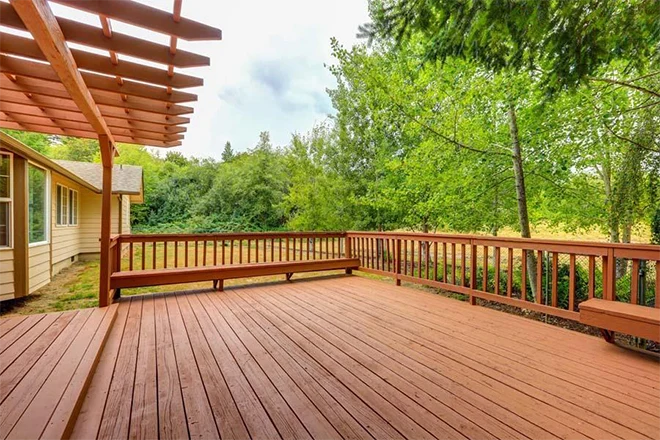
When planning a deck for your Belvidere home, understanding the nuanced differences between deck materials is key to choosing the right option for your lifestyle and budget. This section dives deep into cost comparison, durability and maintenance, aesthetic and design options, and the environmental impact of each of the types of decking materials, helping homeowners in neighborhoods like Boone County Gardens make informed decisions.
Cost Comparison
The initial cost and long-term value of a deck material can vary widely.
A pressure-treated deck is often the most affordable upfront but may incur higher maintenance costs over time.
Other woods are more expensive due to their higher installation and maintenance needs.
Composite decking and PVC decking, while higher in initial investment, offer significant savings in maintenance and longevity, making them cost-effective over the lifespan of the deck.
Aluminum decking, though the most expensive upfront, rarely needs replacement or extensive maintenance, potentially offering the best long-term value.
Durability And Maintenance
The lifespan of your deck is heavily influenced by the deck material’s durability and your commitment to regular maintenance.
Wood decks, including pressure-treated wood and tropical hardwoods, require consistent maintenance, including staining, sealing, and power washing to prevent decay and insect damage.
PVC and Composite decking boasts high durability with minimal maintenance needs, making them appealing for those seeking a low-maintenance deck.
Aluminum decking tops the chart in durability, withstanding harsh weather conditions without rusting or fading.
Aesthetic And Design Options
Your deck should complement your home’s aesthetic and personal style.
Wood decking offers a classic, natural look with the versatility to stain or paint in any color.
Composite and PVC decking come in a wide range of colors and wood grain patterns, providing the beauty of wood without the same level of maintenance.
Aluminum decking, while durable, offers a more modern look that may not blend as seamlessly with traditional home designs.
There are many deck designs you can choose between.
Environmental Impact
For eco-conscious homeowners in Belvidere, the environmental impact of their deck material is a significant consideration.
Wood, while natural, often requires deforestation and chemical treatments.
Composite decking, made from recycled plastic and wood fibers, offers a more sustainable alternative.
PVC decking, though not derived from organic materials, is recyclable and requires less energy to produce than traditional wood.
Aluminum decking is also highly recyclable, making it an environmentally friendly option.
Check out these environmentally friendly deck materials.
Factors To Consider When Choosing Decking Material
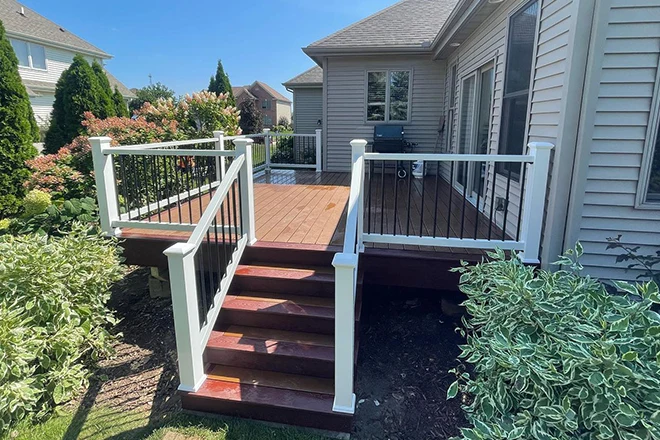
Selecting the right decking material for your Belvidere, IL home involves more than just picking the most visually appealing option or the one that fits within your budget. Several critical factors play into the decision, ensuring your deck not only looks beautiful but also stands up to the local climate, meets your usage needs, and complements your home’s aesthetic. Here’s what to keep in mind as you narrow down your deck material choices.
Climate And Weather Resistance
Belvidere’s climate, with its hot summers and cold, snowy winters, demands decking materials that can withstand a wide range of weather conditions.
For instance, pressure-treated wood and tropical hardwoods are known for their natural durability against moisture and temperature changes, making them suitable for this region.
Composite decking and PVC materials offer excellent resistance to weathering without the need for regular maintenance, a boon for those looking to enjoy their deck rather than upkeep it.
Usage And Traffic
Consider how you plan to use your deck.
Is it for quiet evenings with the family in your Logan Avenue neighborhood, or do you anticipate hosting large gatherings?
High foot traffic demands a durable deck material like composite or aluminum, which can withstand the wear and tear of numerous guests.
Wood decks, while beautiful, may require more maintenance to keep them looking pristine under heavy use.
Personal Style And Home Aesthetics
Your deck should be a continuation of your home’s style, with the deck material seamlessly blending with the architecture and outdoor environment.
Wood decking offers timeless appeal and natural beauty, with options like cedar and redwood providing distinct, rich colors.
Composite and PVC decking materials come in a wide range of colors and textures, enabling homeowners to achieve a particular look or match their home’s exterior.
Aluminum decking, with its sleek, modern appearance, might be the perfect match for contemporary home designs.
Long-term Investment And Value
When considering decking materials, think beyond the initial cost to the long-term investment and value added to your home.
While pressure-treated and other woods might be the most budget-friendly option upfront, its maintenance costs can add up.
Composite and PVC decks, despite their higher initial price point, offer significant savings over time due to their minimal maintenance needs.
Additionally, a well-chosen deck material can enhance your property’s resale value, making it a wise investment in your home’s future.
Installation And Maintenance Tips
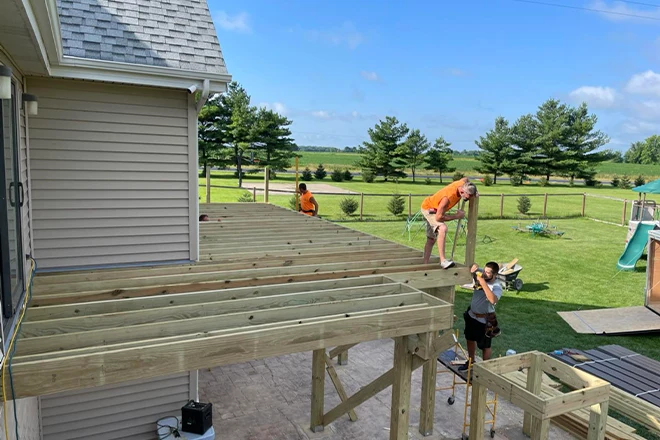
The installation and ongoing care of your deck are crucial to its longevity and performance, especially in a city like Belvidere, where the elements can test the durability of outdoor structures. Here are essential tips to ensure your deck remains a lasting addition to your home.
Installation Considerations
The choice between DIY installation and hiring professional deck builders depends on the complexity of the project and the chosen material.
Wood decks might be within the realm of skilled DIYers, especially with materials like cedar or pressure-treated lumber.
However, composite, PVC, and aluminum decking often require specific tools and knowledge for proper installation, making professional installation a wise choice to ensure the best outcome.
Deck Material Maintenance Best Practices
Regular deck maintenance is key to extending the life of your deck, regardless of the material.
Pressure-Treated Wood
Annual Inspection: Check for signs of rot, termites, and structural damage. Replace damaged boards as needed.
Cleaning: Use a mild soap and water solution or a wood cleaner to remove dirt and grime. Avoid pressure washing this deck material, which can damage the wood.
Staining and Sealing: Apply a water-repellent sealant every 2-3 years to protect against moisture and UV damage. Stain as needed to maintain or change the color.
Cedar And Redwood
Gentle Cleaning: Clean annually with a soft brush and a mixture of mild detergent and water. Rinse thoroughly.
Stain and Seal: Apply a penetrating stain designed for cedar or redwood to enhance and protect the natural color. Reapply a clear water-repellent sealant every year or two.
Composite Decking
Regular Cleaning: Sweep to remove debris and clean with a composite deck cleaner or a simple soap and water solution to remove stains.
Spot Treatment: For tough stains, use a cleaning product recommended by the manufacturer. Avoid using abrasive cleaners that can scratch the surface.
PVC Decking
Simple Cleaning: Use soap and water to clean spills and stains. Rinse with a hose to prevent dirt buildup.
Avoid Harsh Chemicals: Do not use solvents or oil-based cleaners on this deck material. For tough stains, consult the manufacturer’s cleaning guidelines.
Aluminum Decking
Low Maintenance: Periodically rinse with water to remove dirt and debris. Use a non-abrasive cleaner for tougher stains.
Scratch Care: If scratches occur, follow the manufacturer’s instructions for repair or touch-up.
Get Your Best Deck With Hard Decks
When it comes to transforming your outdoor space into a haven of relaxation and entertainment, Hard Decks has got you covered. Our expert team is equipped with the knowledge and experience to guide you through choosing the perfect decking material that aligns with your vision and requirements.
Whether you’re dreaming of a classic wood deck to host your summer barbecues or a low-maintenance composite deck for serene evening lounges, we’re here to turn those dreams into reality.
Don’t let another season pass without making your deck dreams come true; fill out our contact form today, or give us a call to start your journey to the perfect deck.
